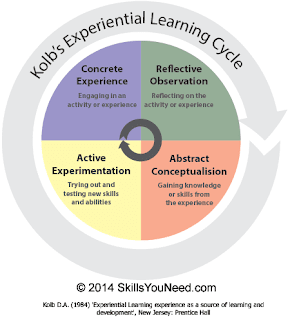 |
| Credit: Waterloo.ca |
While there are several models of adult learning, Kolb's experiential learning cycle is one of the most recognized. In the model, Kolb describes the four stages that learners experiences during the learning process. While some learners tend to gravitate toward one stage, others move through them in a cyclic learning process. No one adult learner is the same and many utilize a variety of these throughout their learning process. It is interesting that adult learners tend to start at different places on the cycle and work their way through using their own preferences. That is one of the beautiful things about the adult learner. It is truly diverse.
In response to the excellent blog post The Interrelationships Between Life Experience and Learning, I would like to focus on one of the four abilities in Kolb's cylcle.
Active Experimentation
One of Kolb's stages focuses on active experimentation (AE). This is something that I personally tend to gravitate toward because I have a scientific approach to everything I do. I, like many other adult learners, enjoy being hands-on and trying out our new found skills and understandings. It is an important part of the learning process.
It is essential for adult learners to be able to apply their knowledge and work with it in a hands-on discovery-based way of learning. Being able to actively particpate in the learning process is essential for the adult learner. With that being said, how can educators and trainers use this stage to help adults learn and process the information presented to them?
Teaching the Adult Learner
One aspect of teaching an adult is to remember that they have experience. Not only on a professional level, but with life as well. When serving as an educator to an adult learner, it is essential the instructor give the adult learner ways to make connections with their experiences and the topic being discussed in the educational setting. One way to facilitate this is for the instructor to help by making personal connections themselves. When an instructor makes a personal connection to a learning situation, it helps the adult learner think about what they have personally experience. I teach college biology courses and I have adult learners who have a wide range of experience to bring to the table. I try to relate personal experiences with the material to help students find connections in their own life. Many times, this opens the door for lots of discussion on the topic in the class and personal experiences. In my years of teaching, this seems to help the adult learners the most. Giving them that initial example triggers those life experiences and connections are made.
 |
| Credit: Cooper, B. |
But sometimes it is just not just the experience of memory that plays an important role in the adult learner's learning process. It is essential for some adult learners to have a hands-on experience. It is essential for the adult learner to "learn by doing". By giving the student a hands-on experience, the adult learner is able to put the pieces together and better relate to them. In the sciences, this process is very simple. Every major topic covered in biology courses have a concrete lab to guide a student through the process and let them gain the experience they need. In other subjects, I find that this could be a little more challenging, but still essential in helping student learn and build a foundation that will help them in their learning process. I would love to hear some ways in which other fields address this process in their subject areas.
Training the Adult Learner
This is where the adult learner will need to help lead in the "active experimentation". One example I can think of is when training faculty to use new technology in the classroom. When training faculty, it is essential that they be given the tool to play around with and work with while they are learning about the new process or technology. It is essential to get the learner to start working with the new technology. If the learner just sits through a training without hands on experience, they may not be open to learning it on their own after the training. I imagine the same works when training workers on new procedures or policies in the work place. Let the learner work through the problems hands-on in order to help them understand the importance of the information. Merely lecturing them with a list of things they need to do or rules they need to follow will not help the learner process the information. They need to understand the "why" of the learning process and letting them work through a hands-on problem through experimentation is essential.
I welcome any comments on the ideas presented. I am just starting to learn to apply the training aspect of adult learning and would be happy to discuss more.
Resources:
Lindeman, E.C. (1926). The meaning of adult education in the United States. New York: Harvest House.
Merriam, S. B., & Bierema, L. L. (2013). Adult learning: Linking theory and practice. John Wiley & Sons.

No comments:
Post a Comment